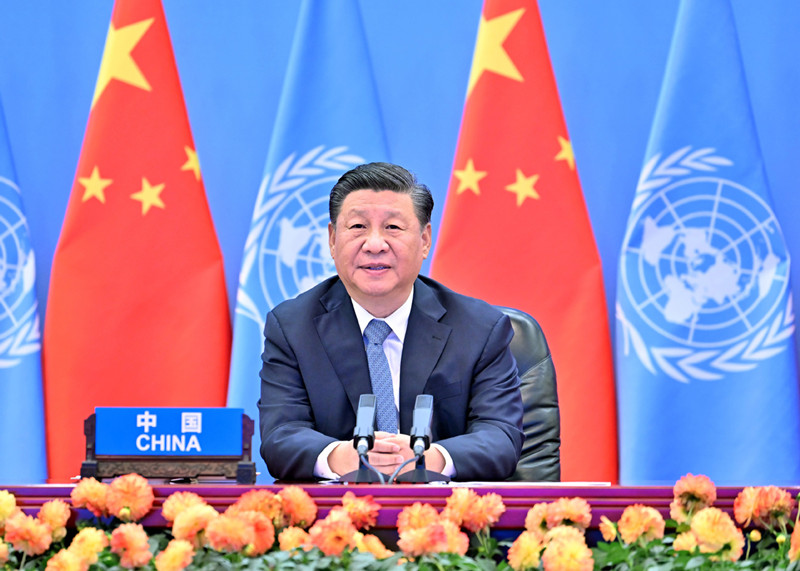Xi's vision strikes chord with UN, world

President Xi Jinping delivers a keynote speech via video link at the opening ceremony of the Second United Nations Global Sustainable Transport Conference, Oct 14, 2021. [Photo/Xinhua]
Chinese wisdom helps shore up global growth, advance peace, multilateralism
President Xi Jinping has introduced Chinese wisdom as well as a slew of solutions and initiatives at United Nations events in recent years that have struck a chord with member states and leaders.
These policy initiatives and the decisive actions of the world's second-largest economy have helped shore up global growth, ensure peace and advance multilateralism, senior officials and experts said. Monday marks the 50th anniversary of the restoration of China's lawful seat at the UN.
Guided by Xi Jinping Thought on Diplomacy, "China shows its great sense of duty as a responsible major country in the face of global challenges and holds high the torch of multilateralism against impulses seeking a 'new Cold War' and cliques", said State Councilor and Foreign Minister Wang Yi.
Under Xi's navigation, China "has been unswervingly serving as a builder of world peace, a contributor to global development, a defender of international order and a provider of public goods", Wang wrote in an article in People's Daily on Wednesday.
After becoming president in 2013, Xi has paid multiple visits to the UN headquarters and delivered major speeches to update the world about China's evolving theories for tackling common global challenges.
One speech in 2015 helped the world learn of Beijing's urging to build a community with a shared future for mankind, while another in 2017 deepened understanding of the concept.
"President Xi first proposed this concept in 2013, and he pushed for this theory's development and spread its use through a slew of critical multilateral conferences," said Yu Jiang, vice-president of the China Institute of International Studies and full-time deputy secretary-general of the Xi Jinping Thought on Diplomacy Studies Center.
"Xi's speech in 2015 at the summit marking the 70th anniversary of the UN's founding in New York made a comprehensive elaboration on the concept, and his speech at the UN headquarters in Geneva in 2017 achieved further synergy between this vision and UN affairs and missions."
Shortly after the 2017 speech, the concept was incorporated into a number of UN resolutions.
"This shows that it meets the UN's original aspiration and various nations' yearning for peace and development, and that the influence of China's diplomatic philosophy has seen historic growth," Yu added.
Starting from this vision, Xi put forward more concepts at global conferences, including his urging to build a "global community of health for all" when he addressed the opening of the 73rd World Health Assembly in May last year.
Chen Xulong, a professor of multilateral diplomacy and UN reform studies at the University of International Business and Economics' School of International Relations, said COVID-19 played a role in the theory gaining acceptance.
"By causing huge casualties, the COVID-19 pandemic sent a major warning to mankind in a pressing and sorrowful way, thus shoring up unprecedented global recognition of the community of a shared future for mankind concept," he said.
The development and perfection of this concept "reflects China's self-confidence in its theories and its passion for taking action", Chen said.
Wang Chao, president of the United Nations Association of China and president of the Chinese People's Institute of Foreign Affairs, said another major Xi proposal to the UN is the Global Development Initiative. The initiative was proposed last month at the general debate of the 76th Session of the United Nations General Assembly.
It calls on the international community to accelerate implementation of the UN's 2030 Sustainable Development Goals for more robust, greener and balanced global development, and the fostering of a global community of development with a shared future.
"This major initiative has set out a blueprint for the development of countries and international development cooperation," Wang said at a Vision China event hosted by China Daily on Wednesday.
UN Secretary-General Antonio Guterres told State Councilor Wang on Sept 27 that the UN attaches great importance to and appreciates the Global Development Initiative proposed by Xi, and the UN will strengthen international coordination to promote its implementation.
On Thursday, leaders and senior officials of Pacific island nations voiced their support for the initiative at a virtual conference with China.
By voicing consistent, strong support via meetings and speeches for the UN, Xi has made remarkable contributions to major changes in global governance, observers said.
In a phone conversation with Xi in May, Guterres said the UN highly commends China's poverty-eradication achievements, its staunch support of multilateralism and UN missions as well as its contributions to tackling climate change and equitable distribution of COVID-19 vaccines.
When addressing the general debate of the 75th Session of the UN General Assembly on Sept 22 last year via video link, Xi said that China "supports the UN in playing its central role in international affairs".
He announced four concrete pledges, including China providing another $50 million to the UN COVID-19 Global Humanitarian Response Plan and $50 million to the China-FAO South-South Cooperation Trust Fund (Phase III).
Zhong Feiteng, head of the Department of Great Power Relations Studies of the National Institute of International Strategy at the Chinese Academy of Social Sciences, said Xi's supportive statements have attracted "huge attention" and reflect China's unchanged commitment to peaceful development.
The world's situation today is different from 70 years ago when the UN was established. "Today's world does not lack organizations playing roles of leaders and coordinators-the question is whether some countries respect the UN or not and whether they champion the UN's status or not," Zhong said.
He said China supports the UN being at the heart of efforts to advance global governance, which shows that "the country will not take advantage of (a global) crisis to vie for power, but further support the UN to coordinate concerted actions from countries around the world".



